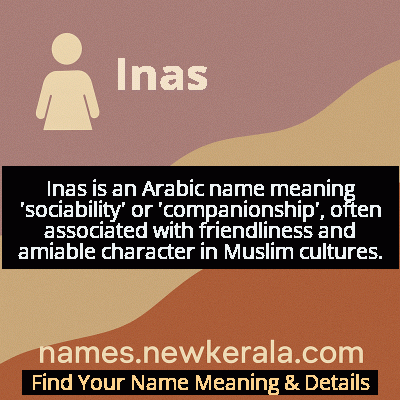Inas Name Meaning & Details
Origin, Popularity, Numerology Analysis & Name Meaning of Inas
Discover the origin, meaning, and cultural significance of the name INAS. Delve into its historical roots and explore the lasting impact it has had on communities and traditions.
Name
Inas
Gender
Female
Origin
Muslim
Lucky Number
7
Meaning of the Name - Inas
Inas is an Arabic name meaning 'sociability' or 'companionship', often associated with friendliness and amiable character in Muslim cultures.
Inas - Complete Numerology Analysis
Your Numerology Number
Based on Pythagorean Numerology System
Ruling Planet
Neptune (Ketu)
Positive Nature
Intuitive, analytical, spiritual, and inquisitive.
Negative Traits
Secretive, reserved, aloof, and can be overly critical.
Lucky Colours
Green, yellow.
Lucky Days
Monday.
Lucky Stones
Cat’s eye, moonstone.
Harmony Numbers
1, 5, 6.
Best Suited Professions
Scientists, researchers, spiritual leaders, detectives.
What People Like About You
Depth of knowledge, analytical skills, spirituality.
Famous People Named Inas
Inas Al-Degheidy
Film Director
Pioneering Egyptian female film director known for addressing social issues in Egyptian cinema
Inas Sarrayyih
Actress
Syrian actress known for roles in popular Arabic television dramas
Inas Mekki
Journalist
Prominent Sudanese journalist and media personality
Inas Nasr
Academic
Egyptian professor and researcher in Arabic literature and cultural studies
Name Variations & International Equivalents
Click on blue names to explore their detailed meanings. Gray names with will be available soon.
Cultural & Historical Significance
Throughout history, the name has been popular among Muslim families who value these social virtues and wish to instill them in their daughters. It represents the cultural emphasis on collectivism over individualism, reflecting societies where community welfare often takes precedence over personal ambition. The name's enduring popularity across generations demonstrates how these core values remain relevant even as societies modernize. In contemporary Muslim cultures, Inas continues to symbolize the ideal balance between traditional values and modern social engagement, making it a name that bridges heritage with contemporary life.
Extended Personality Analysis
Individuals named Inas are typically characterized by their exceptional social skills and natural ability to connect with others. They possess an innate warmth and approachability that makes people feel comfortable in their presence. These individuals are often the social glue in their communities, effortlessly bringing people together and maintaining relationships across different circles. Their empathy and emotional intelligence allow them to understand diverse perspectives and mediate conflicts effectively.
Inas personalities tend to be excellent communicators who value meaningful conversations and genuine connections over superficial interactions. They often exhibit strong nurturing qualities and take pleasure in helping others, making them reliable friends and compassionate family members. Their social nature doesn't mean they lack depth; rather, they use their interpersonal skills to create supportive networks and foster environments where everyone feels included and valued. This combination of social grace and emotional depth makes them particularly effective in roles requiring diplomacy, counseling, or community leadership. They often become the confidantes and peacemakers in their social circles, using their natural talents to strengthen relationships and build community cohesion.
Modern Usage & Popularity
In the modern era, the name Inas maintains steady popularity across Muslim communities worldwide, particularly in the Middle East, North Africa, and among diaspora communities in Europe and North America. While not among the top trending names, it enjoys consistent usage due to its elegant simplicity and meaningful connotation. In recent years, there's been a resurgence of appreciation for traditional Arabic names with positive meanings, which has helped maintain Inas's relevance. The name appeals to contemporary parents seeking a name that balances cultural heritage with modern sensibilities. Its easy pronunciation in multiple languages makes it particularly suitable for families living in multicultural environments. Social media and global connectivity have also contributed to its sustained popularity, as parents can easily research name meanings and cultural significance online. The name's association with positive social qualities makes it especially appealing in an increasingly interconnected world where social skills and emotional intelligence are highly valued in both personal and professional contexts.
Symbolic & Spiritual Meanings
Symbolically, Inas represents much more than mere sociability—it embodies the fundamental human need for connection and community. The name serves as a metaphor for the bridges we build between hearts and the invisible threads that connect individuals within a society. In spiritual contexts, it symbolizes the soul's yearning for connection with the divine and the comfort found in spiritual companionship. The name also represents the idea that true strength lies in our relationships and social bonds rather than in isolation. Like a warm hearth in a home, Inas symbolizes the comforting presence that makes social spaces welcoming and secure. In philosophical terms, it reflects the Islamic concept that humans are inherently social beings whose fulfillment comes through positive interactions with others. The name carries the symbolic weight of being a peacemaker, a unifier, and a creator of harmonious environments where people can thrive together, representing the ideal that our greatest achievements and deepest satisfactions come not from individual accomplishment but from shared experiences and mutual support.

